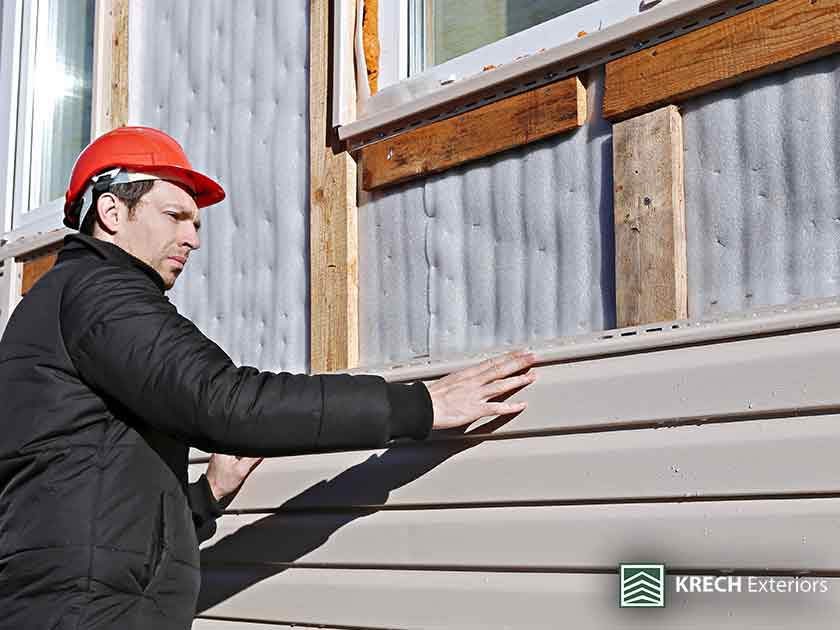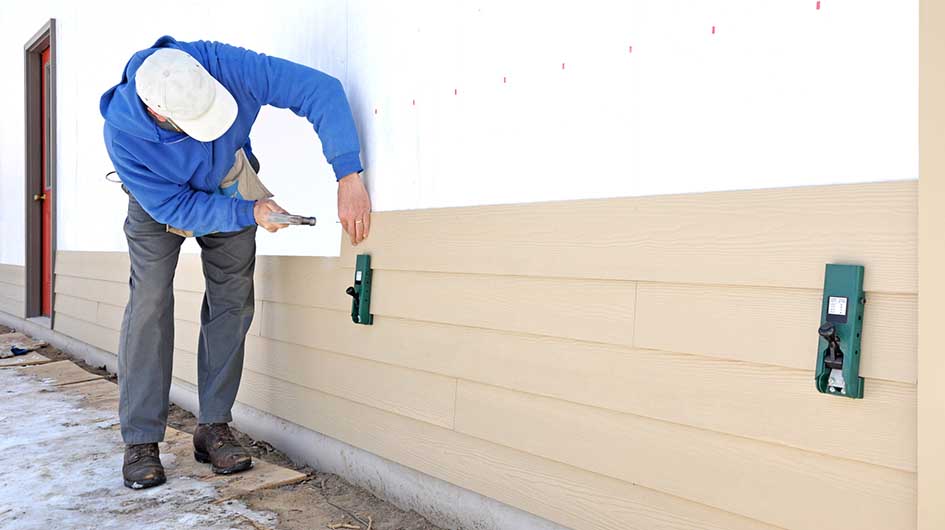The Necessary Guide to the Numerous Sorts Of Siding and Their Special Advantages
In the realm of home improvement, picking the ideal siding is a critical choice that affects both visual charm and functional efficiency. The range of products offered, such as wood, plastic, fiber steel, brick, and cement, each offer one-of-a-kind benefits that accommodate different requirements and choices. Understanding these distinctions can significantly improve the long life and value of a home - morris siding contractor. With so numerous alternatives to consider, which house siding material absolutely stands out for your particular task? Checking out these selections can cause notified decisions that align with both style and usefulness.
Timber Home Siding
Wood exterior siding, a preferred selection for property exteriors, provides a timeless visual that incorporates all-natural charm with structural integrity. This siding product is available in numerous designs, consisting of clapboard, shingles, and board-and-batten, permitting homeowners to personalize their appearance to match their design choices. Wood exterior siding is normally crafted from long lasting types such as cedar, redwood, or pine, which are known for their resilience and capacity to hold up against ecological stress factors.
Among the primary benefits of wood house siding is its excellent insulation properties, which can add to energy effectiveness and lower home heating expenses. In addition, wood house siding is naturally degradable, making it an eco-friendly alternative when sourced sustainably. Routine upkeep, including paint or discoloration, can prolong its life-span and enhance its look, allowing property owners to preserve the all-natural charm of the timber.
Nonetheless, possible downsides consist of vulnerability to parasites, rot, and climate damage, demanding adequate treatment and maintenance - morris siding contractor. Regardless of these worries, when correctly taken care of, wood house siding can provide a gorgeous and long lasting option that improves the personality of a home while using a warm, welcoming environment

Vinyl Exterior Siding
Plastic exterior siding has actually arised as a leading choice for house owners seeking a low-maintenance exterior choice that incorporates resilience and affordability. This functional product is crafted from polyvinyl chloride (PVC), making it immune to numerous weather condition problems, including moisture and UV rays. Therefore, plastic home siding does not warp, rot, or fade, guaranteeing lasting visual appeal.
Among the key benefits of plastic home siding is its considerable series of styles and colors, allowing property owners to accomplish the wanted appearance for their building without the need for constant repainting. Additionally, plastic siding is easy to mount, which can significantly minimize labor prices throughout construction or remodelling jobs.
Vinyl siding also adds to power performance. Many choices function insulation support, which enhances thermal efficiency, assisting to preserve comfortable interior temperature levels and potentially reducing energy expenses. Its smooth surface area promotes very easy cleaning, needing just routine washing with a yard hose to eliminate dirt and debris.
Fiber Cement Home Siding
Fiber cement house siding has actually obtained traction amongst building contractors and house owners alike because of its exceptional mix of longevity and aesthetic adaptability. Made up of a mix of sand, concrete, and cellulose fibers, this home siding alternative is crafted to withstand extreme weather, including high winds, hefty rainfall, and temperature changes, making it a resilient choice for residential exteriors.
One of the key advantages of fiber concrete house siding is its resistance to bugs, such as termites, and its non-combustible nature, offering enhanced fire safety. morris siding contractor. In addition, it is readily available in a vast selection of designs, appearances, and shades, enabling homeowners to accomplish their desired visual without sacrificing efficiency
One more advantage is its low upkeep needs; fiber concrete home siding normally needs paint or discoloration every 5-10 years, which is much less frequent than other products. In addition, its longevity adds to a reduced total price of ownership, as it reduces the need for constant repairs or replacements.
Ultimately, fiber concrete house siding represents an exceptional investment for those seeking a resilient, appealing, and functional exterior alternative, integrating both type and function to improve the home's visual appeal.
Steel Siding
The allure of metal home siding depends on its durable longevity and contemporary aesthetic allure, making it a popular selection for modern style. Offered in products such as light weight aluminum and steel, metal siding provides a variety of surfaces and shades, allowing house owners to achieve a personalized look that complements their design vision.

Energy effectiveness is another significant advantage, as lots of metal house siding products are developed with insulation choices that aid i was reading this regulate indoor temperature levels. This can lead to minimized energy expenses over time. In addition, metal siding is often recyclable, making it an environmentally friendly selection for sustainability-minded property owners.
The installation process for metal house siding can be relatively uncomplicated, causing a quicker turnaround time for building projects. In general, metal home siding combines performance and style, making it Extra resources a practical option for those seeking a aesthetically enticing and long-lasting outside coating.
Brick and Rock Exterior Siding
Brick and stone siding sticks out as an ageless option that enhances the visual appeal of any home. Known for their longevity and reduced maintenance, these materials give an extraordinary roi while raising the home's curb appeal. Available in various shades, textures, and patterns, brick and stone can be tailored to suit diverse building designs, from standard to modern-day.
One of the key benefits of block and rock house siding is their energy performance. Both products have natural insulating residential properties that aid control indoor temperatures, potentially lowering heating & cooling expenses. Furthermore, they use exceptional fire resistance compared to various other exterior siding options, adding to enhanced safety.
One more advantage is their longevity. Block and rock can last for decades, commonly needing very little upkeep beyond occasional cleansing. Unlike wood exterior siding, they are invulnerable to parasites and rot, guaranteeing a durable exterior that endures the components.
Conclusion
In recap, the selection of exterior siding dramatically impacts a home's visual appeal, power efficiency, and maintenance demands. Each sort of siding-- whether wood, plastic, fiber block, cement, or steel and rock-- offers unique advantages customized to numerous homeowner preferences and ecological conditions. Comprehending these options enables notified decisions that boost both the toughness and visual appeal of household outsides. Ultimately, picking the appropriate exterior siding is necessary for attaining a balance between capability and layout in household design.
One of the main benefits of get redirected here timber home siding is its exceptional insulation residential properties, which can contribute to energy efficiency and reduced home heating prices. In addition, wood exterior siding is eco-friendly, making it an ecologically friendly alternative when sourced sustainably.One of the main advantages of metal home siding is its resistance to numerous environmental aspects.Power efficiency is one more substantial benefit, as lots of steel home siding products are created with insulation choices that assist manage interior temperature levels. Each type of siding-- whether timber, vinyl, fiber steel, block, or cement and stone-- supplies unique advantages customized to numerous house owner preferences and environmental problems.